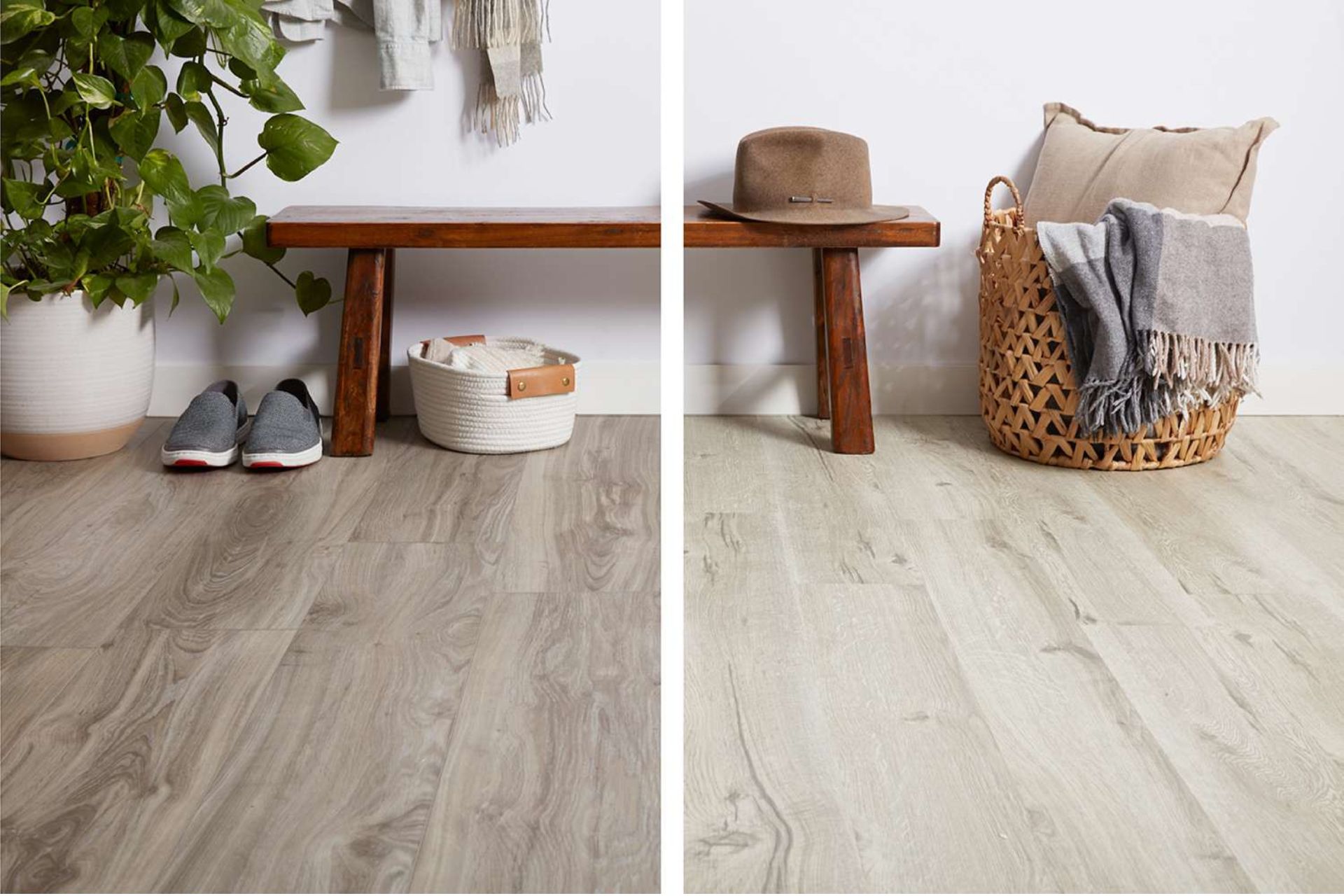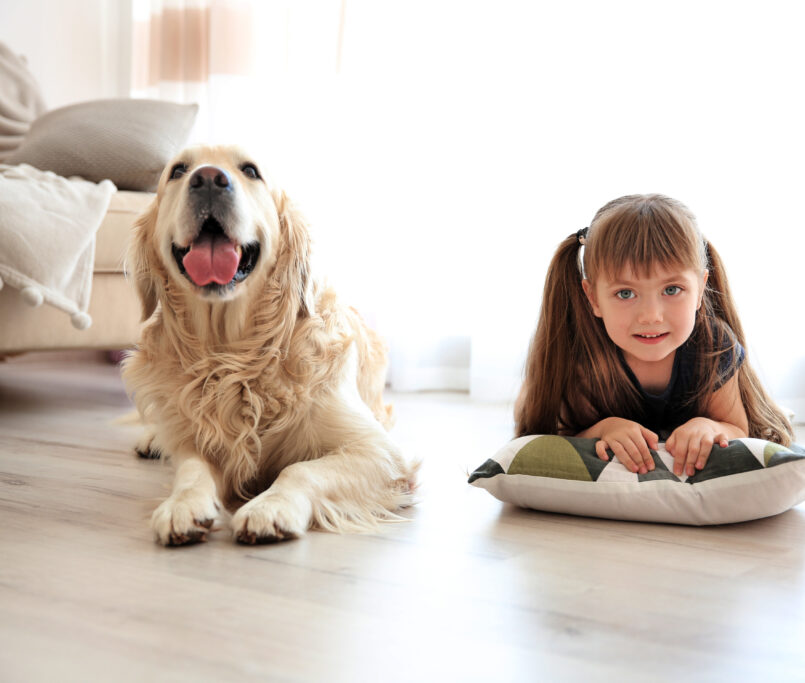When it comes to choosing the perfect flooring for your home, two of the most popular and versatile options on the market today are luxury vinyl plank (LVP) and laminate flooring. Both offer attractive alternatives to natural wood flooring without the hefty price tag, but there are some important differences to consider when deciding which will work best for your lifestyle and space.
At Kelly’s Flooring, we’ve helped countless homeowners in St. Louis choose between these two excellent floor options. In this guide, we’ll break down the pros and cons of luxury vinyl plank and laminate flooring, covering everything from durability and design to water resistance and installation ease.
The Basics: What Are Luxury Vinyl Plank and Laminate Flooring?
Both luxury vinyl plank (LVP) and laminate flooring are considered floating floors, which means they don’t need to be nailed or glued down. Instead, they “float” over your existing subfloor, making them easy to install. Both options are designed to mimic the look of natural wood or tile, giving you the aesthetic appeal of higher-end materials like hardwood or stone at a fraction of the cost. However, the materials and construction are where these two differ.
Luxury Vinyl Plank (LVP) is made from several layers of synthetic materials, including a robust design layer that replicates the texture and appearance of real wood, tile, or stone. One of the biggest advantages of LVP is its water resistance, which makes it an ideal choice for moisture-prone areas like kitchens, bathrooms, and basements.
Laminate flooring, on the other hand, also features a design layer that mimics wood or stone, but it’s made primarily from compressed fiberboard with a wear layer on top. While laminate is durable and offers a realistic wood appearance, it’s not as resistant to water as LVP, which can lead to issues like water damage if exposed to moisture for extended periods.
Durability and Lifespan
When selecting flooring material, durability is often a top priority, especially in high-traffic areas. Both luxury vinyl flooring and laminate flooring offer impressive longevity, but there are some key differences.
Luxury Vinyl Plank is highly resistant to scratches, dents, and general wear and tear, making it ideal for busy households with children and pets. It can last up to 25 years or more, depending on the quality and how well it’s maintained. In particular, LVP’s ability to withstand water damage gives it a leg up over laminate, especially in areas prone to spills and moisture.
Laminate flooring is also highly durable but not quite as water-resistant as LVP. High-quality laminate can last 20 years or more, but it’s more susceptible to damage if exposed to standing water. While laminate is generally tough against scratches and scuffs, excessive moisture can cause it to warp or bubble, so it’s best suited for dry areas like living rooms, bedrooms, and hallways.
Water Resistance
One of the key differences between these two flooring options is how they handle water exposure.
Luxury Vinyl Plank is often marketed as waterproof, making it a popular choice for kitchens, bathrooms, and basements where moisture is a concern. Unlike laminate, you can use a wet mop to clean LVP without worrying about damaging the floor. The multi-layer construction and waterproof core mean it won’t swell or warp, even in the face of significant water exposure. If you’re looking for a floor that can handle spills and high humidity, LVP is the go-to option.
Laminate flooring, while resistant to small spills when cleaned up quickly, isn’t fully waterproof. Excessive moisture can seep into the seams and cause the flooring to swell, leading to permanent water damage. While there are newer laminate products on the market with improved water resistance, they still don’t match the performance of LVP in wet conditions.
Aesthetic and Design Options
Both luxury vinyl plank and laminate flooring offer stunning visual appeal, but the choice ultimately depends on the specific design style you’re after.
Luxury Vinyl Plank is available in a wide range of styles, colors, and textures that closely replicate the look and feel of natural wood, tile, or stone. With the right design layer, luxury vinyl flooring can be almost indistinguishable from real hardwood or tile. Plus, it’s available in a variety of plank sizes and even comes in tile shapes, making it a versatile choice for different interior designs. Whether you’re going for a rustic wood look or sleek modern tile, LVP has a floor option to suit your style.
Laminate flooring also offers a variety of design options and can look quite realistic, especially in terms of mimicking natural wood. However, the texture tends to be less varied than what you’ll find in LVP. Some laminate floors have a smooth surface, while others attempt to replicate the texture of real wood grain, but they may not achieve the same level of realism as higher-quality luxury vinyl flooring.
Cost Considerations
When it comes to price, both laminate and luxury vinyl plank flooring are budget-friendly compared to hardwood and tile.
Laminate flooring tends to be slightly less expensive, with prices typically ranging from $1 to $5 per square foot. It’s a great option if you’re working with a tighter budget but still want the look of natural wood. Keep in mind that higher-end laminate products, which offer better water resistance and a more durable wear layer, may come closer in price to luxury vinyl flooring.
Luxury Vinyl Plank can range from $2 to $7 per square foot, depending on the brand, thickness, and quality of the design layer. While it might cost a bit more upfront, the superior water resistance and longevity make it a worthwhile investment for areas of your home where moisture is a concern.
Maintenance and Cleaning
Both laminate and vinyl flooring are known for being easy to install and maintain. Regular sweeping or vacuuming, along with occasional mopping, will keep them looking great for years to come.
Luxury Vinyl Plank is the clear winner when it comes to ease of cleaning. Its water resistance means you can safely use a wet mop for a deeper clean without worrying about damaging the floor. You won’t have to worry about moisture seeping into the planks, which makes LVP a low-maintenance option for busy households.
Laminate flooring, while durable, requires a bit more care when it comes to moisture. It’s best to avoid excessive water when cleaning laminate floors. Instead, use a damp (but not wet) mop or laminate-safe cleaning products to keep the floors looking their best without causing water damage.
Which Flooring Is Right for You?
The decision between luxury vinyl plank and laminate flooring comes down to your specific needs and preferences. If you’re looking for a highly water-resistant, durable flooring option that mimics the look of wood or tile, luxury vinyl flooring is an excellent choice. Its ability to withstand moisture and heavy foot traffic makes it a versatile option for any room in your home, from the basement to the kitchen.
On the other hand, if water resistance isn’t a top priority and you’re seeking a budget-friendly alternative that still delivers on style and durability, laminate flooring offers great value. With proper care, laminate can last for 20 years or more, providing a beautiful and affordable solution for your home.
At Kelly’s Flooring, we’re here to help you explore all your flooring material options, whether you’re interested in the practicality of luxury vinyl or the affordability of laminate. Visit our luxury vinyl flooring store in St. Louis to view samples and discuss the best solution for your space!












